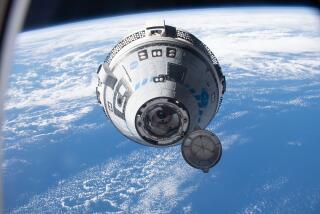Space Tourism in a Holding Pattern
- Share via
MOSCOW — Russian space officials said Monday that they have put the country’s space tourism program on hold because of the space shuttle catastrophe, but they vowed to continue flying tourists to the international space station for cash once questions over the shuttle’s future are resolved.
“This is good money for Russia, and we do not plan to end tourist flights under any conditions. Naturally, at present, all commercial launches have been delayed for an indefinite time,” Russian Aviation and Space Agency spokesman Sergei Gorbunov told the Interfax news agency.
Russia’s cash-starved space agency reaps a reported $20 million per tourist flight.
Gorbunov predicted the shuttle’s suspension could continue for two years, meaning tourist flights would also be on hold for that long. Space shuttle flights are suspended pending the investigation of the Columbia disaster.
“The Americans must decide what they really want to do. They have not made any official addresses to Russia. Negotiations are under way only on the level of technical specialists of the two countries,” Gorbunov said.
The chief of the agency’s manned space programs department, Mikhail Sinelshchikov, told Itar-Tass on Monday that Russian Soyuz and Progress spacecraft would take over the shuttle’s role of ferrying the main crews, cargo and fuel to the space station.
“The thinking behind short-term flights will have to be revised. Russian Soyuz TMA manned spacecraft will now deliver main crews to the ISS. Short-term expeditions will have to be abandoned,” he said.
Sinelshchikov said the top priority was to keep the space station manned and to continue international space research at the station. But further construction of the station would come to a standstill, he said.
Five space shuttle flights were planned this year to deliver about 40 tons of equipment. Russia’s cargo craft, Progress, carries a fraction of the space shuttle’s payload.
An unmanned Progress rocket lifted off Sunday on a mission planned before the Columbia tragedy to deliver food and fuel to the space station. It is expected to dock with the station today.
Russia, America’s main rival in space exploration during the Cold War, has fallen behind since the collapse of the Soviet Union, frequently failing to meet deadlines on supply commitments for the space station. The main reason is a severe cut in funding to Russian space research.
The pride of Russia’s space industry, the Mir space station, operated well beyond its planned lifespan, but Russia brought it to Earth in 2001, leaving Russia with no flagship space research program of its own.
Russian mission control chief Vladimir Solovyov told Russian television Monday that the country expected to launch a Soyuz spacecraft to deliver a new crew to the international space station in late April or mid-May, bringing the crew back to Earth. He said the makeup of the new crew had not been decided.
Russian cosmonaut Pavel Vinogradov on Monday cautioned that even a short break in the manning of the station after the Columbia disaster would cause problems.
“Should the ISS be suspended even for a while, the effectiveness of research on board will fall drastically. The space station’s reactivation takes too much time. Every opportunity must be used to prevent the ISS from going idle,” he said.
Russian Space and Aviation Agency General Director Yuri Koptev wrote to NASA on Monday with a formal offer of help investigating the cause of the Columbia accident.
“Russia is ready to provide any assistance in analyzing the causes of the tragedy and reducing the risk of such accidents in the future,” Koptev wrote.
He said staff at the agency and people all over Russia were grieving over the loss of the Columbia crew.
A solemn ceremony to commemorate the loss of life on Columbia took place Monday at Russia’s space mission control center at Korolyev, just north of Moscow.
“I would like to convey my deepest condolences to the families and next of kin of the astronauts who perished because of this tragedy,” Koptev wrote, “and share your anguish over the damage that has been caused to the U.S. space program.”
More to Read
Sign up for Essential California
The most important California stories and recommendations in your inbox every morning.
You may occasionally receive promotional content from the Los Angeles Times.













